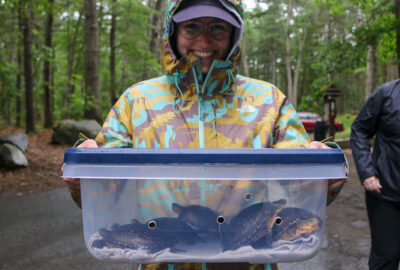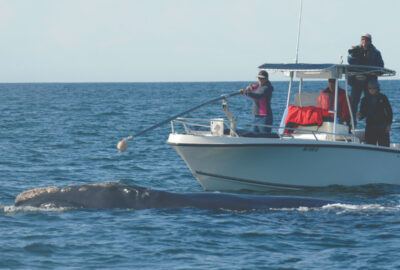Happy World Ocean Day!
By New England Aquarium on Tuesday, June 08, 2021


Thank you for celebrating Party for the Planet with us over the past seven weeks! Today we are finishing our celebration with World Ocean Day. This holiday reminds us we are all connected through our shared ocean and that collectively we have the power to create positive change for this special place. We hope that over the course of Party for the Planet you have learned ways to take action to protect our blue planet. We encourage you to celebrate World Ocean Day by doing at least one of those things!
If you are still looking for a little inspiration, here are a few ways you can celebrate World Ocean Day:
Learn something new and share with your friends and family!
Educating yourself about the ocean and the challenges it faces is a great first step to moving toward action. Remember to share what you have learned with others. We make a bigger, positive change when we work together.
You could read a new book to learn about the ocean. Perhaps start an ocean book club or simply pass your book on to a friend. Here are a few recommendations to get you started:
- The North Atlantic Right Whale: Disappearing Giants by Dr. Scott Kraus, et. all
- Sea Change by Dr. Sylvia Earle
- Blue Mind by Wallace J. Nichols
- Ocean Country: One Woman’s Voyage from Peril to Hope in her Quest To Save the Seas by Liz Cunningham
Prefer learning through film? Host your own ocean-themed film festival! Choose a few short videos like those on The Story of Stuff website or this collection of ocean related TED talks. Or go big and select a double feature of your favorite ocean documentaries. We like these:
Make some changes to your daily habits!
There are simple choices we make every day that can reduce our impact on the ocean. You can lessen your carbon footprint by choosing clean energy, replacing single-use plastics, and selecting products and companies that have the environment in mind. Find out what your community is doing to protect our ocean and get involved. Here is a list of some great resources:
- Switch to renewable energy.
- Choose to refuse single-use plastics.
- Find ways to make a difference beyond your household.
Clean up your favorite beach or green space!
Did you know that roughly 80% of marine debris comes from land-based sources such as sewage runoff or industrial waste? So even if you don’t live near the ocean, organizing a trash clean-up day can make a huge difference for ocean life. You can do this with a small group like your family, or get your whole community involved. If you need some advice on how to get started, consider reading this great post about organizing a clean-up near you.
Use your voice to promote change!
Let your local, state, and national leaders know that the ocean is important to you. Make sure you are registered to vote. Voting with the environment in mind can make a lasting impact. Consider writing a letter or attending a meeting to speak up for our oceans. Your leaders care what you have to say and will choose policies that their constituents support.
Use your voice right now!
Coral reefs cover less than 1% of the ocean floor but support over 25% of marine life. They are also one of the most endangered ecosystems on earth. Scientists estimate that unless we take immediate action, we could lose up to 70 percent of coral reefs by 2050. Establishing strong protections for these vital ecosystems also gets us one-step closer to protecting 30% of our ocean by the year 2030.
Members of the Senate have introduced the Restoring Resilient Reefs Act. Members of the House of Representatives have also introduced identical legislation. These bills would reauthorize and modernize the Coral Reef Conservation Act of 2000, strengthen NOAA’s Coral Reef program, and give innovative new tools and resources to the non-federal partners at the state, territory, and local community level.
Let your representative know that you support protecting coral reefs by signing this digital letter:
https://act.newmode.net/action/aquarium-conservation-partnership/help-restore-coral-reefs




